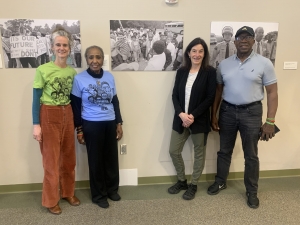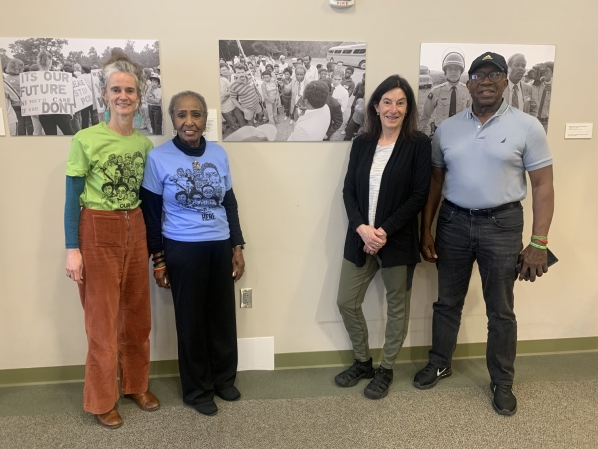The Goodnight Family Sustainable Development (SD) Department recently co-hosted (with Appalachian State's Office of Sustainability and Energy Management and Appalachian Studies) Environmental Justice (EJ) Movement legends Dollie Burwell, Rev. Bill Kearney, Jenny LaBalme, and John Rash on campus for a series of events in an Earth Month Celebration of the EJ Movement.
Burwell, a veteran of the Civil Rights movement, is an activist and leader in the EJ Movement. In the 1980s and 90s, Burwell became known as the Mother (and now Grandmother) of the U.S. EJ Movement due to her leadership in grassroots, non-violent resistance to the dumping of toxic chemicals in her home town of Warren County, NC. Rev. Kearney developed the Warren County Environmental Action Team (WCEAT), a network of organizations and individuals working together to record, celebrate, and share Warren County’s EJ legacy, natural resources, and diverse cultures. Photojournalist Labalme originally photographed the 1982 Warren County protests as part of a documentary photography class she took while a student at Duke University, and later published the photos in her book, A Road to Walk. Rash is a professor and filmmaker at the Southern Documentary Project, an institute of the Center for the Study of Southern Culture at the University of Mississippi. His work aims to preserve the stories of the American South, especially those from underserved and under-documented communities.
On April 15, these special guests visited with students, and later that evening, the Appalachian Theater in downtown Boone hosted a screening of Rash and co-director Melanie Ho's documentary film, "Our Movement Starts Here," followed by a panel discussion with Burwell, Kearney, LaBalme, and Rash, moderated by SD Department faculty member Dr. Rebecca Witter. The film tells the story of a rural community in Warren County, North Carolina, that inspired the EJ Movement and articulated the concept of environmental racism. During the moving discussion, panelists talked about the influences of their ancestors on their work, the significance of their work as progenitors and chroniclers of the EJ Movement, and how they sustain themselves as they continue their work. On April, 16, Burwell, Kearney, LaBalme, and Rash joined students and community members for lunch and fellowship at F.A.R.M. Cafe on King Street. In addition, from April 13-17, Appalachian State's Belk Library hosted part of the historic exhibit, “We Birthed the Movement," curated by UNC-CH University Libraries. The exhibition included nine historic images from the Warren County PCB Protests and a video wall featuring the full collection.
Sponsors and supporters of this event inluded Appalachian State's Office of Sustainability and Energy Management, the Goodnight Family Department of Sustainable Development, the Center for Appalachian Studies, AppDocs, Appalachian State's QEP "Pathways to Resilience," the Department of Sustainable Technology and the Built Environment, the Department of Public Health, the Research Institute for Environment, Energy, and Economics (RIEEE), the Sustainable Development Teaching and Research Farm and team, including Chip Hope, Todd Rudicill, and Carol Coulter; Belk Library, the Turchin Center for the Visual Arts, Sustainability Program Director, Jennifer Maxwell, Co-director of the University Documentary Film Services, Professor and Filmmaker Tom Hansell, SD Department faculty Drs. Aniseh Bro and Alexia Witcombe, F.A.R.M. Cafe, numerous student volunteers, the Appalachian Theater, Creative Printing, the Lovill House Inn, UNC-CH Library Archives, and the Southern Documentary Project. For more information on "Our Movement Starts Here," see https://southdocs.org/project/omsh/.
Pictured from left to right are Dr. Rebecca Witter, Dollie Burwell, Jenny LaBalme, and Rev. Bill Kearney.

